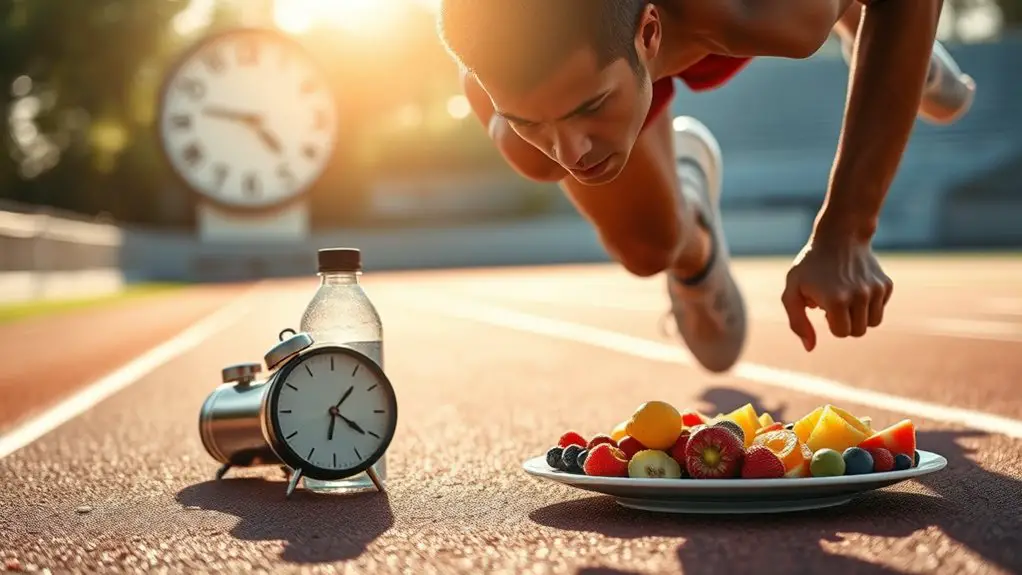Intermittent fasting can notably boost your athletic performance by optimizing energy metabolism. It helps your body switch from glucose to fat for fuel, enhancing endurance and reducing energy crashes. You might notice improved mental clarity and focus during workouts. Plus, its flexible eating windows can make meal planning easier and less stressful. However, it's important to be aware of potential risks and find what works best for you. There's more to explore about how it can fit your training.
Understanding Intermittent Fasting
What exactly is intermittent fasting, and why has it gained so much popularity? It's a flexible eating pattern that alternates between periods of eating and fasting. Unlike traditional diets, it doesn't restrict what you eat; instead, it focuses on when you eat. This approach allows you to enjoy freedom from constant meal planning and calorie counting, making it appealing to those seeking a more liberated lifestyle. With various methods like the 16/8 or 5:2, you can choose what fits your life best. Many find that intermittent fasting simplifies their routine, enhances their energy levels, and even supports weight management. Ultimately, it empowers you to take control of your health without the constraints of conventional dieting.
Mechanisms of Fasting and Energy Metabolism
When you engage in intermittent fasting, your body undergoes significant changes in energy metabolism that can enhance athletic performance. During fasting, your insulin levels drop, prompting your body to switch from burning glucose to utilizing fat as its primary energy source. This shift can improve your fat oxidation rates, helping you tap into your energy reserves more efficiently. Additionally, fasting triggers the release of hormones like growth hormone, which supports muscle preservation and fat loss. As your body adapts, you may experience increased mental clarity and focus, allowing for more effective training sessions. Embracing this metabolic flexibility not only liberates you from constant eating but can also elevate your performance to new heights.
Impact on Endurance Performance
Although endurance athletes often rely on carbohydrate-rich diets, incorporating intermittent fasting can greatly enhance performance. By allowing your body to adapt to using fat as a primary energy source, you'll tap into a more efficient fuel system. During fasting, your insulin levels drop, promoting fat oxidation and improving your overall endurance. You might find that your energy levels stabilize, enabling you to push through long runs or rides without the usual crashes associated with carb-heavy fueling. Plus, the mental clarity you gain can enhance focus during training. Embracing intermittent fasting can free you from constant meal prep, letting you enjoy your workouts more. Ultimately, it's about finding a balance that works for your body and supports your endurance goals.
Effects on Strength Training
While many strength trainers prioritize consistent meal timing and high protein intake, intermittent fasting can still play a significant role in your strength gains. By focusing your eating window, you may find that your workouts feel more intense and focused. The energy boost you get from fasting can help you push through tough lifts and increase your overall performance. Plus, fasting encourages your body to adapt and utilize stored energy effectively, which can enhance muscle growth over time. You might also discover that you appreciate the freedom of not having to plan meals around every workout, allowing for a more flexible lifestyle. Experimenting with intermittent fasting could lead to surprising results in your strength training journey, giving you the freedom to thrive.
Recovery and Muscle Repair
As you plunge into intermittent fasting, you might wonder how it impacts recovery and muscle repair. This approach can actually enhance your recovery if you use it wisely. Here are three key points to reflect on:
- Hormonal Balance: Fasting can boost growth hormone levels, aiding muscle repair and growth.
- Cellular Repair: Intermittent fasting encourages autophagy, a process that helps remove damaged cells, making way for new muscle tissue.
- Nutrient Timing: By concentrating your eating window, you can optimize nutrient intake post-workout, ensuring your body has what it needs for recovery.
Embracing intermittent fasting doesn't mean compromising your recovery. Instead, it can empower you to fully maximize your body's potential while maintaining that sense of freedom you crave in your training.
Considerations for Different Types of Athletes
Recovery and muscle repair are essential for athletes, but how intermittent fasting affects performance can vary greatly depending on the sport and the individual. If you're a strength athlete, the timing of your meals might matter more, as building muscle needs consistent fuel. Endurance athletes, on the other hand, may find intermittent fasting beneficial for fat adaptation, as long as they manage their energy levels. For team sport athletes, balancing speed and endurance while fasting can be tricky. It's vital to listen to your body and adjust your approach based on your training demands. Ultimately, experimenting with different fasting protocols can help you discover what gives you the freedom to thrive in your sport without compromising performance.
Potential Risks and Drawbacks
Intermittent fasting can offer benefits, but it also comes with potential risks and drawbacks that athletes should consider. Here are three key points to keep in mind:
- Energy Depletion: You might find yourself feeling more fatigued during workouts, especially if you're not fueling your body properly during eating windows.
- Nutrient Deficiency: Restricting your eating hours could lead to missing out on essential nutrients, impacting your overall health and performance.
- Mental Focus: You may experience mood swings or decreased concentration, which can affect your training and competition, particularly if you're not used to fasting.
Ultimately, it's vital to weigh these risks against the benefits to make an informed decision that aligns with your athletic goals.
Practical Tips for Athletes Considering IF
Considering intermittent fasting (IF) can be a game-changer for athletes, but it requires careful planning. First, choose an eating window that fits your training schedule; this flexibility lets you maintain energy levels. Start with shorter fasting periods to adapt gradually—your body needs time to adjust. Focus on nutrient-dense foods during eating windows; think lean proteins, whole grains, and plenty of fruits and veggies to fuel your performance. Stay hydrated, as water is essential during fasting. Listen to your body—if you feel fatigued or sluggish, re-evaluate your approach. Finally, consider consulting a nutritionist for personalized guidance. Embracing IF can offer freedom in your routine, but balance is key to optimizing your performance without compromising health.
Frequently Asked Questions
Can Intermittent Fasting Help With Weight Loss for Athletes?
Intermittent fasting can definitely aid weight loss for athletes. You'll find it helps regulate your appetite and boosts fat burning. Just remember to balance your energy levels for peak performance during training and competition.
How Does Intermittent Fasting Affect Hydration Levels During Training?
When you're fasting, hydration's essential—thirst whispers, "Drink!" During training, you might feel more dehydrated, so stay aware. Balancing water intake can keep you energized, ensuring your body flows with freedom and performance.
Is Intermittent Fasting Suitable for Young Athletes?
Intermittent fasting might not be ideal for young athletes. Their bodies need consistent energy for growth and performance. You'll want to focus on balanced nutrition to support both training and development without restrictions.
Can Intermittent Fasting Improve Mental Focus During Competitions?
While some athletes thrive on consistent meals, you might find intermittent fasting sharpens your mental focus during competitions. It's all about what works for you—freedom lies in discovering your unique path to peak performance.
What Should Athletes Eat During Their Eating Windows?
During your eating windows, focus on whole foods—lean proteins, whole grains, healthy fats, and plenty of fruits and veggies. It'll fuel your performance and recovery, keeping you energized for your next challenge.




